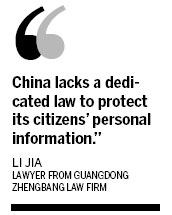

Police across the country have arrested more than 1,700 people on suspicion of stealing or misusing personal information, according to the Ministry of Public Security.
Under the ministry's deployment, police in 20 provincial-level regions, including Beijing and Shanxi, uncovered 38 operations where people's personal details were being illegally traded, according to a statement posted on the ministry's website on Tuesday night.
In the first-ever crackdown of its kind, 611 companies that illicitly conducted surveys were closed, and 161 unauthorized databases were destroyed.
"We'll continue fighting such criminal activities to safeguard people's personal information," Zhang Hongqiang, a publicity officer with the ministry, said on Wednesday.
He said the ministry will also strengthen cooperation with government departments to reduce the amount of personal information leaked. He also urged the public to be more cautious and report to the police if they find their private details have been misused.
In October, police in Beijing and Guangdong looked into several organized crime cases where personal information had been illegally accessed.
On the basis of evidence collected, the ministry found that some employees of financial institutions, telecommunication companies or other organizations with massive personal databases, were selling on consumers' personal information.
However, most criminals were trading information online under false identities and were able to quickly destroy evidence, so it was difficult to track them down, the ministry statement said.
The use of personal information in telecom fraud, kidnapping and forceful debt collection was on the increase, it said.
Zhou Shuangcheng, an employee of an IT company in Xi'an, capital of Northwest China's Shaanxi province, was arrested in August 2011 for selling the personal details of millions of mobile phone users.
Zhou took advantage of his firm's access to phone users' data as an IT service provider for a local telecom company.
According to a report in the Procuratorial Daily, in his last action, Zhou sold the information of about 10 million mobile phone users, including their names, gender, addresses and ID card numbers, for 5,000 yuan ($800).
His client, He Zonghui, who was also arrested, admitted he then sold the personal information to real estate developers who used text messaging to advertise.
Li Jia, a lawyer from Guangdong Zhengbang Law Firm in Guangzhou, urged the government to speed up legislation to protect personal data.
"China lacks a dedicated law to protect its citizens' personal information. There is no clear definition of personal information, and no indication of how many people's personal details have to be stolen before it can be regarded as a serious crime," he said.
National standard guidelines on protecting personal information are due to be issued this year, Huang Zihe, associate director of the China software testing center affiliated to the Ministry of Industry and Information Technology, said earlier this month.
The guidelines, drafted by the center and 30 other organizations, propose that it should be mandatory for service providers to gain permission from individuals before using their personal information.
hedan@chinadaily.com.cn